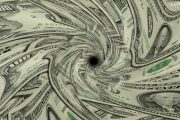
To hurdle the federal government’s looming “fiscal cliff,” Congress and the president must enact a combination of higher taxes and spending cuts, says a group of business economists. However, before the government does that, the economists add, it must maintain the ongoing fiscal stimulus through 2013.
Responding to a survey about the nation’s economic recovery, the National Association for Business Economics (NABE), and its 236 members, said the government should extend payroll tax cuts, current income tax rates, current tax rates for investment, and other tax cuts passed under George W. Bush, which are set to expire by the end of this year.
However, whether to keep the tax cuts permanent was another matter, as nearly three-quarters of the economists say the payroll tax cut extension should only be temporary. Moreover, the group affirmed a 50/50 split on whether to make tax cuts on income, dividends, and capital gains temporary.
Nearly 60 percent of respondents suggested that the nation’s current monetary policy was “about right,” while the number of economists asserting that U.S. monetary policy was “too stimulative” dropped from the number who held that view in March. Meanwhile, the percentage of economists responding that monetary policy was “too restrictive” took a slight boost. The Associated Press reported further on the survey:
The economists said the Federal Reserve should not buy more bonds to support and stimulate the economy, as it has in the last few years. The survey was conducted between Aug. 2 and Aug. 24, before the Federal Reserve announced a third round of bond buying on Sept. 13.
Just 53 percent of the economists said that the action already undertaken by the Fed, known as quantitative easing, has been a success.
In terms of regulation, the NABE survey found that two-thirds of respondents support government rules that would bar financial institutions from trading for their own accounts. Only about half of the economists believe those banks that are “too big to fail” should be broken up.
While the group was evenly split on whether the federal government should subsidize the development of so-called “green” energy sources, a minority (40 percent) held the view that President Obama’s controversial healthcare reform law should be repealed. Still, about 75 percent acknowledged that healthcare costs would continue to spike over the next decade if ObamaCare is not repealed.
The NABE survey presents an interesting narrative, one that many politicians, analysts, and the general public may decipher as economic “truth.” It’s an ongoing tale: “The economists said it, so it must be correct!”
The act of drastically cutting spending, which NABE economists favor in the long-term, welcomes praise from free-market economists, those who support a diminished government presence in the marketplace. Cutting spending, such economists affirm, is the sensible counteragent to massive deficits. But the majority of those surveyed in the NABE study favor a rising tax burden to complement the purported spending cuts.
Prominent French economist Jean Baptiste Say, in his book A Treatise on Political Economy, explains why taxation, and in turn the attack on the acquisition and production of property, only leads to economic degradation and a lowering of the general standard of living:
It is a glaring absurdity to pretend, that taxation contributes to national wealth, by engrossing part of the national produce, and enriches the nation by consuming part of its wealth.
Taxation is the transfer of a portion of the national products from the hands of individuals to those of the government, for the purpose of meeting public consumption or expenditure. Whatever be the denomination it bears, whether tax, contribution, duty, excise, custom, aid, subsidy, grant, or free gift, it is virtually a burden imposed upon individuals, either in a separate or corporate character, by the ruling power for the time being, for the purpose of supplying the consumption it may think proper to make at their expense; in short, an impost, in the literal sense.
Economists of the Center for Data Analysis (CDA) issued a report in 2010 addressing the Bush tax cut extensions and surmised that the 10-year economic impact of the Democrats’ and President Obama’s ploy to inflate taxes on the nation’s “wealthy” would be devastating. The 10-year economic impact, according to CDA economists, would result in curbed economic growth, less job creation, and higher U.S. unemployment:
Slower economic growth: Inflation-adjusted gross domestic product (GDP) would fall by a total of $1.1 trillion between FY 2011 and FY 2020. GDP in 2018 would fall by $145 billion alone. The growth rate of the economy would be slower for the entire 10-year period.
Fewer jobs: Slower economic growth would result in less job creation. Employment would fall by an average of 693,000 per year over this period … in one year alone, 2016, job losses top 876,000.
More unemployed Americans: Slower growth in employment translates to a higher unemployment rate, which would rise more each year during the 10-year period than it would without the Obama tax hikes.
In terms of monetary policy, and the looming QE3 injection that Federal Reserve Chairman Ben Bernanke plans to initiate, NABE members seem to be content with further market manipulation. After all, some 60 percent of them are content with Bernanke’s hyper-manipulative monetary policy.
Writing on behalf of the libertarian Ludwig Von Mises Institute, adjunct scholar Frank Shostak counters this position, asserting that the U.S. central bank’s monetary measures only curb economic growth while contributing to a looming inflationary hailstorm. “We suggest that by introducing further massive monetary pumping Bernanke is running the risk of severely damaging the US economy,” Shostak writes. “Consequently, this raises the likelihood that the US could remain in a depressed economic state for a prolonged period of time.”



